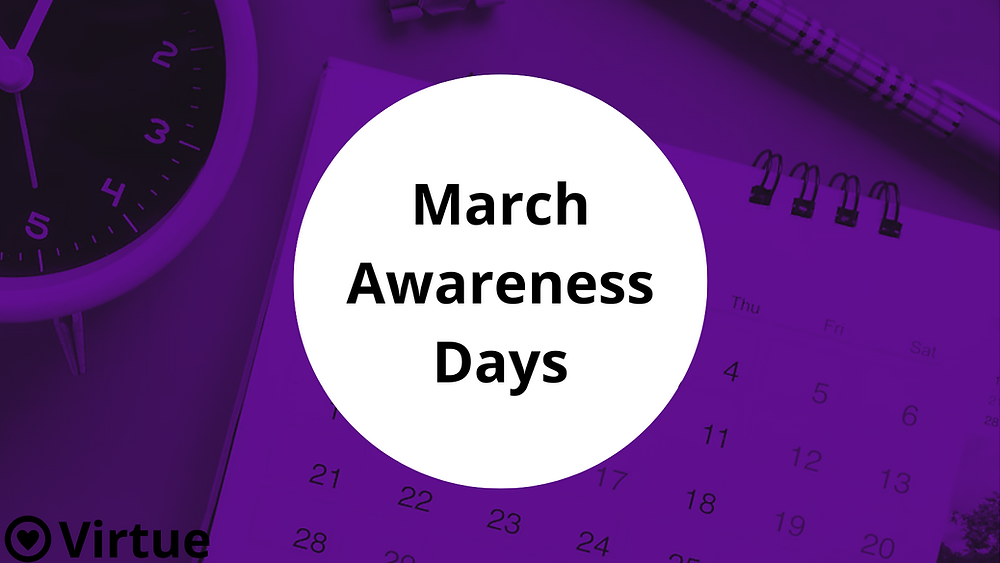March Awareness Month

As we step into March, a month filled with vibrant colors and renewed life, it's also a time to acknowledge and raise awareness about various important health and social issues. March Awareness Month encompasses a wide range of causes, each significant in its own right, aiming to educate, support, and foster a community around those affected. From colorectal cancer to multiple sclerosis, and from nutrition to brain injury awareness, March is a month of multifaceted advocacy, highlighting the complexity and interconnectedness of human health and social challenges.
Key Points
- March is recognized for raising awareness about several health issues, including colorectal cancer, multiple sclerosis, and brain injury.
- Nutrition Month in March emphasizes the importance of healthy eating habits and balanced diets.
- Awareness campaigns during March focus on educating the public, supporting those affected, and promoting research into various health conditions.
- Community engagement and participation are crucial for the success of awareness months, encouraging empathy, understanding, and action.
- Raising awareness also involves addressing the social determinants of health and promoting equitable access to healthcare services.
Health Awareness in March

Among the plethora of health issues highlighted during March, colorectal cancer awareness stands out. As one of the leading causes of cancer deaths worldwide, early detection and prevention through screenings and healthy lifestyle choices are paramount. The colorectal cancer awareness month campaigns aim to reduce stigma, promote education, and encourage individuals to discuss their risk factors with healthcare providers. Similarly, multiple sclerosis awareness month seeks to support those living with MS, a chronic and often disabling autoimmune disease affecting the central nervous system. Nutrition Month serves as a reminder of the critical role diet plays in overall health, emphasizing the importance of informed food choices and balanced nutrition for preventing and managing chronic diseases.
Brain Injury Awareness
Brain Injury Awareness Month is another significant campaign, focusing on the impact of brain injuries on individuals and their families. Brain injuries can result from accidents, sports, falls, or military service, leading to cognitive, emotional, and physical challenges. Raising awareness about brain injuries involves promoting safety measures, such as wearing helmets during sports and cycling, and supporting research into more effective treatments and rehabilitation strategies. The brain injury community comes together in March to share experiences, provide support, and advocate for better services and understanding.
| Awareness Cause | Description |
|---|---|
| Colorectal Cancer Awareness | Early detection, prevention, and support for those affected by colorectal cancer. |
| Multiple Sclerosis Awareness | Raising awareness and supporting research for multiple sclerosis, a chronic autoimmune disease. |
| Nutrition Month | Promoting healthy eating habits, balanced diets, and nutrition education for overall health. |
| Brain Injury Awareness | Awareness, support, and advocacy for individuals and families affected by brain injuries. |

Community Engagement and Advocacy

The success of March Awareness Month campaigns heavily relies on community engagement and advocacy. Volunteerism, fundraising, and participating in awareness events are ways individuals can contribute. Moreover, using social media platforms to share personal stories, facts about the conditions, and support messages can amplify the reach of awareness campaigns, encouraging more people to get involved. Advocacy extends beyond the month of March, as sustained efforts are necessary to push for policy changes, increase funding for research, and ensure that the needs of affected communities are continually addressed.
Social Determinants of Health
Raising awareness about health issues in March also involves addressing the social determinants of health, which include socioeconomic status, education, employment, and access to healthcare services. These factors significantly influence health outcomes and can exacerbate disparities in healthcare access and quality. By acknowledging and working to address these determinants, awareness campaigns can promote more equitable health outcomes and support the well-being of marginalized and underserved populations.
What is the primary goal of March Awareness Month?
+The primary goal is to educate the public, support those affected by various health conditions, and promote research and advocacy efforts.
How can individuals contribute to awareness campaigns during March?
+Individuals can contribute by volunteering, fundraising, participating in events, sharing information on social media, and advocating for policy changes and research funding.
Why is addressing social determinants of health important for awareness campaigns?
+Addressing social determinants of health is crucial because these factors can significantly impact health outcomes and exacerbate healthcare disparities. By acknowledging and working to address these determinants, campaigns can promote more equitable health outcomes.
In conclusion, March Awareness Month serves as a pivotal moment for raising awareness about critical health and social issues, fostering community, and advocating for change. Through education, support, and collective action, we can work towards a future where everyone has access to the care and resources they need to thrive. As we move forward, it’s essential to maintain the momentum of these awareness campaigns, ensuring that the conversations started in March continue throughout the year, driving meaningful change and improved outcomes for all.



